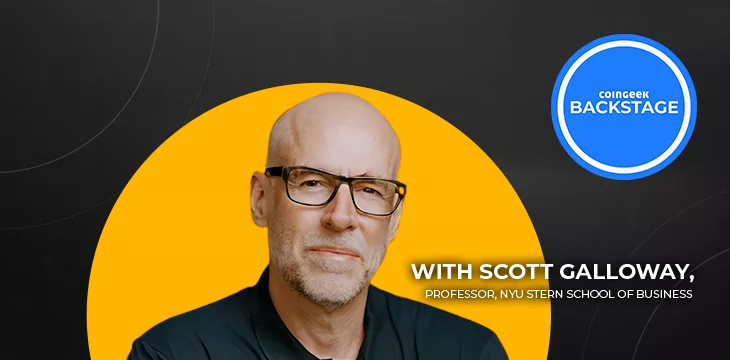|
Getting your Trinity Audio player ready...
|
After giving a thought-provoking keynote speech at the London Blockchain Conference 2024, Professor Scott Galloway joined Kurt Wuckert Jr. on CoinGeek Backstage to discuss the United States’ demographics and what they mean for the economy, blockchain as a productivity tool, and using decentralized ledgers to manage data.
US is having a baby bust, and it’s linked to money
Wuckert begins by highlighting Galloway’s statement about legions of young men who can’t connect with others in the real world and who immerse themselves in technology as a result. He also mentioned how GLP-1 drugs could lead to a baby boom. Are these at odds with each other?
Galloway says they are, and the baby boom won’t be sustainable. The average 70-year-old is now significantly richer than they were four years ago, and the average under 40 is less so. Galloway puts the numbers at a 72% increase for the older generation and a 24% decrease for the younger ones.
In 1980, 63% of able-bodied people between 30 and 34 had children. Now, it’s only 27%, a significant decline. Galloway says it’s simply not affordable to have children. He warns that we need to figure this out because Japan, China, and Italy face dire economic consequences, which can send the economies into freefall.
“If we don’t figure out a way to provide more prosperity and put more money in the pockets of young people, we are just essentially going out of business.” – @profgalloway at @LDN_Blockchain. #macroeconomics #blockchain #LDNBlockchain24 pic.twitter.com/l8mpiOccgC
— CoinGeek (@RealCoinGeek) May 21, 2024
Focusing on the tax code and the breaks it offers, Galloway pinpoints the smaller rate on buying and selling assets (capital gains) as opposed to income and lower interest rates on mortgages as two tax breaks that transfer wealth from younger people to the older generation.
Blockchain as a productivity tool
Galloway has criticized blockchain for failing to do much of anything productive. If we could have a scalable blockchain that reduces friction, would it be valuable?
Focusing on Michael Saylor’s decision to put MicroStrategy’s cash into BTC, Galloway says it’s a big, bold bet and isn’t about productivity as such. He has heard of a few interesting blockchain apps and the possibility of decentralized digital currencies outside the control of authorities. However, he can’t think of many ways blockchain tech touches peoples’ daily lives like Google Search (NASDAQ: GOOGL) or AI does.
Galloway says use cases haven’t matched the hype around blockchain so far. We’re at a “question mark stage,” he says. It may bounce back or fade away, and only time will tell.
Junk data and using blockchain to refine AI models
Wuckert mentions how Galloway has talked a lot about junk data. He notes that a previous proof-of-work model was designed to filter out email spam. He wonders if ensuring the quality of data fed into AI models could be a valuable use for blockchain technology.
Galloway says it’s a great vision, but he wonders who will be the judge of better data. He’s unaware of anyone doing this right now, but he agrees it’s a good potential use case for blockchains.
Watch: Day One Summary at #LDNBlockchain24

 03-03-2026
03-03-2026 




